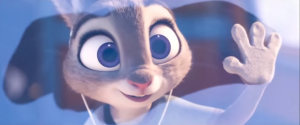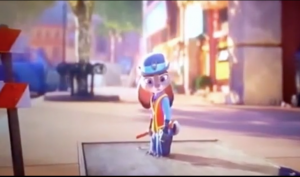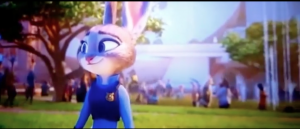
Apparently the word “utopia” translates to “no where” in the English language when looking at the Greek roots of the word. If this were to be true it would really put a damper on my argument. The concept of a utopia is a multifaceted sphere that has it’s roots in different aspects. It can be described as a literary genre, something that is irreconcilable with fantasies, or a society that offers the best of the best for its citizens. The animated Disney movie Zootopia depicts an anthropomorphic society in which an inexplicable cause of predators reverting back to their feral state stands to threaten the former peaceful coexistence between predators and prey. Officer Judy Hopps, the determined and lovable main bunny, epitomizes the classic growing up story we have all seen in pop culture: she was beaten up when she was younger for standing up for her friends, enrolls in the police academy because she does not want to follow in the repetitive paths of her parents, struggles for a bit but then starts to kick some serious butt after realizing her dreams are on the line, and joins the real world with immense expectations after graduating at the top of her class. Pretty inspiring, right?
Narrow and confined attitudes in regards to expectations will almost surely lead to restlessness, as seen with Officer Hopps. She initially adheres to the notion that Zootopia is an already made utopia, and what this city has to offer for its citizens will remain constant. Apparently harmonious on the outside, the inside is not at all what it seems. There are tensions between the different classes of animals, and outsiders such as Officer Hopps, having grown up in a borough outside of Zootopia, believe that everyone can be anything they choose. She expects that everything will be easy, and that she’ll have it made immediately upon arrival. Having firm expectations about what a society is going to offer is a sure fire way to immediately face dissatisfaction. Too often the citizens of Zootopia elect to remain in the position they are dealt. This reluctance is seen when Officer Hopps is assigned her first job as being a parking maid: she somberly accepts her fate as being delegated to hand out tickets. The failure to recognize the differences between what a society describes itself to be, and what a society can be through efforts made by its citizens to make it better makes the difference between being content and feeling restless. The lack of fluidity of how Officer Hopps first lives when she arrives to Zootopia results in fake happiness; she does not realize that she has to try to make her own utopia, even if it requires failure in the process of doing so.
That being said, utopia’s are not just there. They have to be created. Creation comes about by trying different paths and failing until eventually the path chosen culminates in a successful way. It ends with feeling reassured, pleasured, and proud with what you are doing. So, what does the creation of a utopia mean? It encompasses the notion of creating a space where you can feel happy. The theory of utopia is that even when we seem the most jacked into the currently existing system, we are betraying (in our thoughts, words, and choices) our desire for something different, some sort of other system that is better (Thorne). The betrayal that Officer Hopps exhibits is not explicit. In Richard Dyer’s Entertainment and Utopia, the editor ponders:
How does show-biz fulfill such utopian desires? Not by literally representing a perfect society (like Sir Thomas More’s Utopia), but (i) by ‘non-representational means’- through music, colour, movement, and so on, and (ii) by picturing relations between people more simply and directly than they exist in actuality. (271)
Thus, the utopian-esque qualities are reflected in the soundtrack of the movie. Shakira’s song, “Try Everything” is aptly named. It is an implicit yet permeating soundtrack that reflects the character arc of Officer Hopps: her excited arrival to Zootopia, her confrontation with the sharp-witted fox Nick Wilde who illuminates the injustice in the city, and her enlightenment at the end of the movie in realizing that utopias are forged are all embodied in the lyrics of the song. (“Try Everything”) It is an effort made by the movie producers in trying to express Officer Hopps’s need to try everything, rather than her expecting anything. The presence or absence of the song in different scenes of the movie is working in efforts to undermine the idea that Zootopia is an already made utopia. Utopias are best when its citizens engage in an active lifestyle.
Actively shaping your role in society versus passivity is central to the movie. It is vital that the audience understands that Officer Hopps’s mindset towards Zootopia is passive in the beginning of her character journey. As she boards the Zootopia Express, she cannot wait to see what it has to offer for her. The signs that she sees on her journey are purposeful. They are representations of her attitude. The “Express” in the name of the train signifies that living in a utopia can be fast tracked, and that it will be brought to you regardless of the effort being put into living a better life. Also, she passes by a billboard with huge lettering that reads, “Zootopia Welcomes You”. It stands to serve that Zootopia has everything to offer and that everything that one could possibly need is already there. It’s implications are that a society already exists that fits the needs of everyone. Welcoming implies that you are going to be hosted, and negates the fact that the lifestyle is reciprocal. The citizens get what they put out.
The directors made specific choices in both how the song is initially played and matching the camerawork to the beat of the song in order to orient the audience towards how Officer Hopps’s expectations of Zootopia are extremely high. The way “Try Everything” is played during this scene represents Officer Hopps’s rigid mindset. It does not just start playing in the background. It is not all encompassing and does not touch everything it sees. She physically has to take out her iPod, plug in her headphones, and click “play”. She has to be fed the message of the song. It has to be told to her. Officer Hopps is glossy eyed as she stares out onto the horizon, and is fascinated with the possibilities that she thinks she will experience, and in doing so, the song and its message are forced into the back of her head. Also, when the camera angle focuses on a close up of the glimmering city, it stutters out two more times to encompass the entirety of the society. It’s glamorous. It’s beautiful. But the purposeful shifting from a narrow to broader view of the entire city (including the different sub-sections that are seen later in the movie as perilous and dark) is a representation of how it’s hopeful citizens need to open their eyes more to the different possibilities, which as seen in the movie, are constituted on opposite sides of the spectrum. It’s possibilities are both constructive in making the citizen happy, but can also be depressive.
The absence of soundtrack in scenes where Officer Hopps is questioning her role in Zootopia illuminates how stuck in the mud (or wet cement specifically) she is in creating her perfect place. It’s message is repressed. Nick Wilde, the sly fox who eventually helps Officer Hopps so perfectly puts it, “Everyone comes to Zootopia thinking that they can be anything they want. Well, they can’t. You can only be what you are”. Shakira sings, “I keep falling down, I keep on hitting the ground/ I always get up now to see what’s next”. She hasn’t gotten up. She in a rut, and furthermore, was openly berated for assuming that everything was going to be perfect for her. Is it starting to become apparent how her expectations are skewed?

Officer Hopps actively beginning to engage in establishing peace between the predators and prey within Zootopia is mirrored in her realization that she is actively shaping her own establishment in society. She stuck it to the big boss, and tackled the case with help from Nick. She tried everything in order to solve the case. There are layers of complexity. The song is speaking to her physical actions, her physical actions shape her attitude, and her attitude shapes how she sees herself in Zootopia. She becomes confident, reassured, and content. She explains, “We have to try… I implore you, try. Try to make the world a better place. Look inside yourself and recognize that change starts with you. It starts with me. It starts with all of us”. The implicit song has finally met up with her explicit vocalization. In the closing scene, “Try Everything” is not playing in her headphones. It’s booming from speakers, encompassing the partygoers at a big concert. It has extended its reach from one small bunny to the entire population.

Yet, we can wonder if her diligence in creating her own utopia is typical of utopian settings of Disney movies. Adding another layer of complexity to Disney utopian movies, multiple scholarly articles claim that Disney is focusing on spreading the message that women are passive and need to be told to revert back to their traditional roles by a man. Alexander M. Bruce rightfully disagrees with the notion that, “Disney thereby teaches its audience that women should fulfill the passive role in society, [and] not acting [towards their future]” (Bruce 2). In tandem, Deborah Ross discusses the notion that Disney movies, such as The Little Mermaid, reduce the heroine to objects of desire because the movie culminates with marriage (Ross 60). Do Disney movies reinforce gender constructs? In this instance, no. Take a look. At the level of the plot, Officer Hopps was in a rut but eventually kicks butt in the end and solves the case, albeit with the help of a male character. But their relationship is reciprocal. Plus, the movie culminates with a concert where Officer Hopps encourages Nick to dance, thus establishing a relationship in which the female can exert influence over the man. At the implicit level, Shakira is a woman who is singing about trying new things. Thus, Zootopia, at it’s inherent nature disagrees with both statements because it’s main message is that characters, even females, can create their own utopias, and thus will not be subject to oppressive themes unless they do not actively choose to create it. In the wise words of Officer Hopps, “[It] turns out real life is more complicated than a slogan on a bumper sticker.”
Works Cited
Bruce, Alexander M.. “The Role of the “Princess” in Walt Disney’s Animated Films: Reactions of College Students”. Studies in Popular Culture 30.1 (2007): 1–25. Web. 21 April 2016
Dyer, Richard. “Entertainment and Utopia.” Only Entertainment. New York: Routledge, 1992. 271-283. Print.
Ross, Deborah. “Escape from Wonderland: Disney and the Female Imagination”. Marvels & Tales 18.1 (2004): 53–66. Web. 24 April 2016
Shakira. “Try Everything.” Rec. 31 Dec 2015. Zootopia. Stargate Records, 2016. MetroLyrics. Web. 24 April 2016.
Thorne, Christian. Lecture. 16 April 2016.
“Zootopia.” World Movies Free. 2016. Web. 20 April 2016.
“ZOOTOPIA – Train Scene (Try Everything) [HD 1080].” Youtube. 2016. Web. 24 April 2016.
